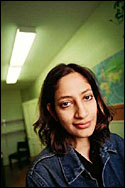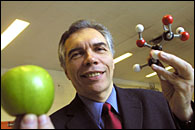Kaleidoscope
Vrinda Narain: Rights and wrongs
 PHOTO: Claudio Calligaris
PHOTO: Claudio Calligaris |
|
Years ago, a penniless 72-year-old sued the man who was divorcing her for support, and won. Then she renounced her own victory, refusing her ex's money.
"It was because of community pressure," explains Vrinda Narain, who followed the hearing through India's supreme court as a law student. "The religious leaders told her she was a bad woman, a bad Muslim, and that her husband was a good Muslim. She was forced to reject the judgement."
It's the case that helped focus Narain's law practice -- and her later academic work, looking at the balancing act between women's and religious rights.
She revised and has just published her McGill master's thesis through the University of Toronto Press under the title Gender and Community: Muslim Women's Rights in India.
"It's really about minority rights in any pluralistic democracy," she says.
"Group rights and individual rights are always presented as being opposite. We need to look at religious rights and women's rights as not being mutually exclusive."
Before arriving at McGill, Narain took on legal aid cases for women during six years of private practice in Delhi. And through a non-governmental organization, she wrote a legal manual for Muslim women, training travelling counsellors to explain the law to the mostly illiterate women in largely rural and tradition-bound India.
She ended up at McGill in 1995, where she got her master's degree in law. With her husband at Yale, she next volunteered in the legal department for the city of New Haven, Connecticut. Her foreign degree kept her from practising in the U.S.
Both returned to Montreal -- he to teach in McGill's School of Computer Science, she to begin a PhD in law at the University.
With a feisty two-year-old to care for, it will take her another two years to finish her thesis, she estimates. The 36-year-old balances school and home with her duties as the vice-president of the South Asian Women's Community Centre (SAWCC).
"Sometimes I can barely get up to brush my teeth," she says of her schedule. But the volunteer work is essential.
"It's one way to stay in touch with the community. Otherwise, being an academic could be so isolating."
SAWCC provides a variety of services to South Asian women, many of them recent immigrants with few places to turn to for support. Keeping SAWCC going is itself a major challenge. "We're always on the verge of being in the red. Women's centres are underfunded," Narain says simply. "We're not taken seriously."
Narain says Indian criminal and commercial laws were rewritten by the British in the mid-1800s, but "personal law" -- family law -- was left as is. "It was a way for them to maintain control, because it kept the natives happy. They only changed those bits of family law that interfered with day-to-day business," says Narain.
Each religion has its own different set of rules (there's one personal law for Christians, for example, another for Hindus, yet another for Muslims).
The Muslim man in the case that captivated Narain argued that, under personal law, he was exempt from spousal support. The court ruled instead that, in cases of severe need, secular law should be applied.
Worried that it would lose Muslim votes, the government later passed a resolution formally excluding Muslim women from the secular law (it generally comes into force only for atheists and inter-marrying couples).
Narain calls for a uniform civil code in India, wiping away the last vestiges of the religious.
Accommodation must come from talking and listening. "I wouldn't want to set up a regime of rights that trumps other rights. It's very complex and nuanced, and there's no simple solution to anything."
Legal protections by themselves are not enough. There has to be the political will to follow through. Women's equality is enshrined in the Indian constitution, "though women's rights have been jettisoned.
"It's important to continue to engage with law, no matter how hopeless. Law reform is critical for equality in India."
Narain is hopeful about seeing change, but guarded. "Secular democracy is in crisis in India. I am an optimist, one has to be. But I don't see a time frame."
 |
||||
|
It is something that worries us. In the same way that an employer might call into question the value of the degree, we have to be cautious about students [who arrive from Harvard]. |
||||
A pinch of paprika, a dash of parsley
 Professor Joe Schwarcz
Professor Joe SchwarczPHOTO: Owen Egan |
|
As the director of the McGill Office for Chemistry and Society and as the chief consultant for such Reader's Digest books as Foods That Harm, Foods That Heal, Joe Schwarcz talks about the chemistry of food a lot -- its health properties, its origins, its safety (as in genetically modified food, for instance).
Turns out that Schwarcz has more than a scientific interest in what's cooking -- he is a whiz in the kitchen himself.
A few months back, Schwarcz teased the Czech cook who prepared meals at the deli near Schwarcz's home that the cook's goulash couldn't compare to the chemistry professor's own Hungarian-style version. Bring it on, McGill boy, the cook challenged.
So Schwarcz whipped some up and brought it in. It proved to be a hit with customers. So much so, that the deli asked Schwarcz to start supplying them regularly with the stuff.
He modified his recipe, replacing the veal with tofu, so vegetarians could eat it too. As the goulash sales kept ringing up, Schwarcz started supplying another delicacy, Hungarian noodles and cabbage.
The popular science popularizer has had food on his mind a lot of late.
He recently finished taping an upcoming TV show for the Discovery Channel called "Science to Go." Each episode takes a playful look at the science behind a common food -- hamburgers, pizza, chocolate and wine, among them.
Shows were taped across North America in thematically appropriate settings -- such as, a cereal-themed amusement park in Battle Creek, Michigan (home to the Kellogg's cereal empire), and the largest meat-packing plant in Canada (which processes 4,000 unlucky cows each day).
Schwarcz's growing side business has been keeping him so busy, he had to shop around for an industrial kitchen to take over the cooking chores.
Schwarcz produced a pamphlet about his goulash, which, in keeping with his day job, carefully outlines the nutritional value of each of the meal's ingredients. Still, Schwarcz the chemist bows to Schwarcz the cook when assessing the popularity of the product.
"If it doesn't taste good, nobody is going to eat it. People talk health, but they eat taste."
Dr. Joe's Vegetarian Goulash is available at Qualitifruits on Westminster and Café Roccoco on Lincoln. "Science to Go" begins airing on the Discovery Channel on June 25.
 |
||||
|
She's non-threatening. She doesn't challenge anyone's prejudice. |
||||

